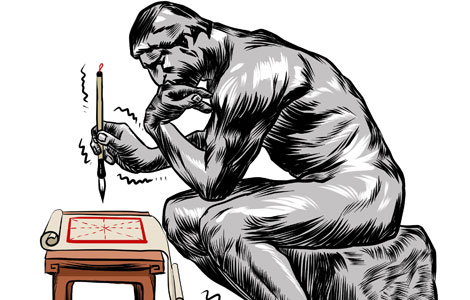Officials: A matter of faith
Updated: 2013-10-09 09:51
By Ji Zhebu (China Daily)
|
|||||||||||
A dangerous signal
The public often takes stories about Party members' belief in religion or superstitions as a form of entertainment, but experts have warned that the phenomenon has sent out a dangerous signal.
"The root of the problem lies in the unfair and less-than-transparent system for selecting talent, the relationship-oriented social atmosphere, and China's ineffective supervision and punishment mechanism on corruption," said Xiao Tangbiao, a professor at the School of Government at Nanjing University.
Drastic remedies are called for. Without them, even the measures that require Party members to confirm their belief in Communism will not be enough to stop people secretly turning to other belief systems, he warned.
Cheng Ping, a professor at the Department of Social and Cultural Studies at the Chinese Academy of Governance, echoed that view and said superstition is a deep-rooted problem among government officials. Nowadays, some Party members don't seem to believe that anything is worth defending with their own lives and are motivated by nothing more than personal interest, according to Cheng.
"It's extremely difficult to rebuild faith and ideals, which can take hundreds of years to establish but only minutes to overthrow," she said.
Cheng's statement is not intended to shock or attract attention, but is based on a 2006 survey conducted under her leadership by the Chinese Academy of Governance.
The survey showed that roughly 28.3 percent of government officials at county or departmental level believed in telling fortunes by reading a person's face. Meanwhile, 18.5 percent believed in traditional Chinese dream interpretation, 13.7 percent believed in horoscopes, and 6 percent believed in drawing "fortune sticks" at temples.
The survey's findings were based on 900 replies from officials in 17 cities, provinces and autonomous regions. Around 87 percent of the respondents were aged between 35 and 54.
A different survey into the political attitudes of local officials, conducted between 2003 and 2004 by Xiao, indicated a serious level of discontent among those polled.
The 571 interviewees were all local officials and 97.2 percent of them were Party members. They worked at county- and city-level government departments in a number of provinces.
To the question: "How do you view the present official selection and appointment system?" more than 52 percent chose "Basically alright", while 45 percent opted for "Not fair and transparent". The others declined to answer.
"The survey only involved a small number of people and therefore is not fully representative, but in some senses it tells us that some of the officials were repulsed by what they saw happening in official circles," commented Xiao.
Professor Cheng said that although promotion is partly influenced by individual effort, that doesn't necessarily mean that people will attain the positions they covet simply through hard work.
"Some of the factors influencing the selection and promotion of officials are too unpalatable to be put on the table. Therefore, the officials have to look for spiritual sustenance from religion because they cannot control their own futures," said Cheng.
Today's Top News
CNOOC offering 25 blocks for cooperation
Li plans to seek deeper trust with neighbors
Obama to name Yellen as next Fed chair
Obama says he'll negotiate once 'threats' end
Xi calls for more APEC connectivity
Hey, big Chinese spenders
Wet weather fails to dampen FTZ interest
Service-sector expansion slows
Hot Topics
Lunar probe , China growth forecasts, Emission rules get tougher, China seen through 'colored lens', International board,
Editor's Picks

|

|

|

|

|

|





